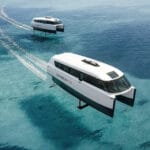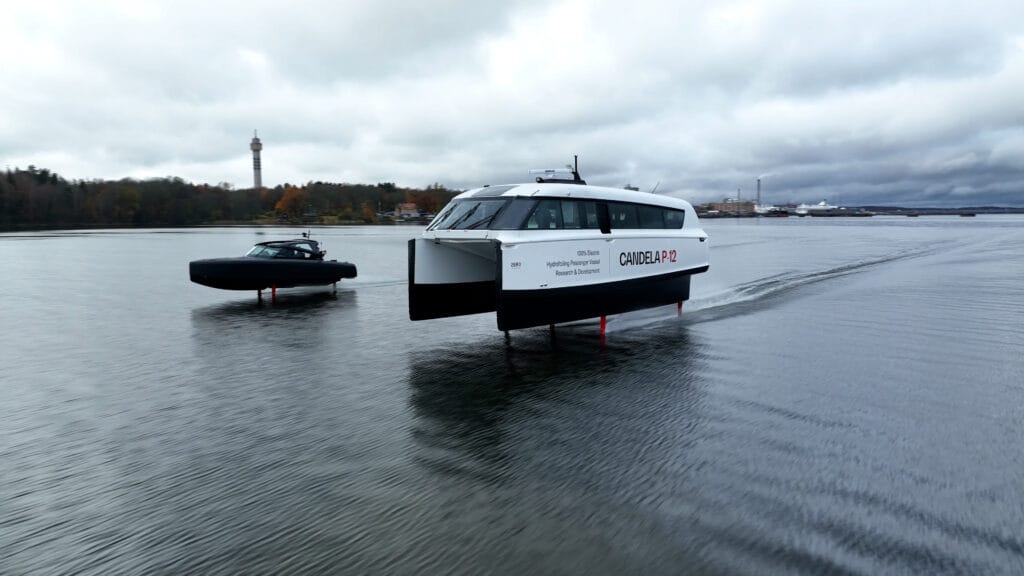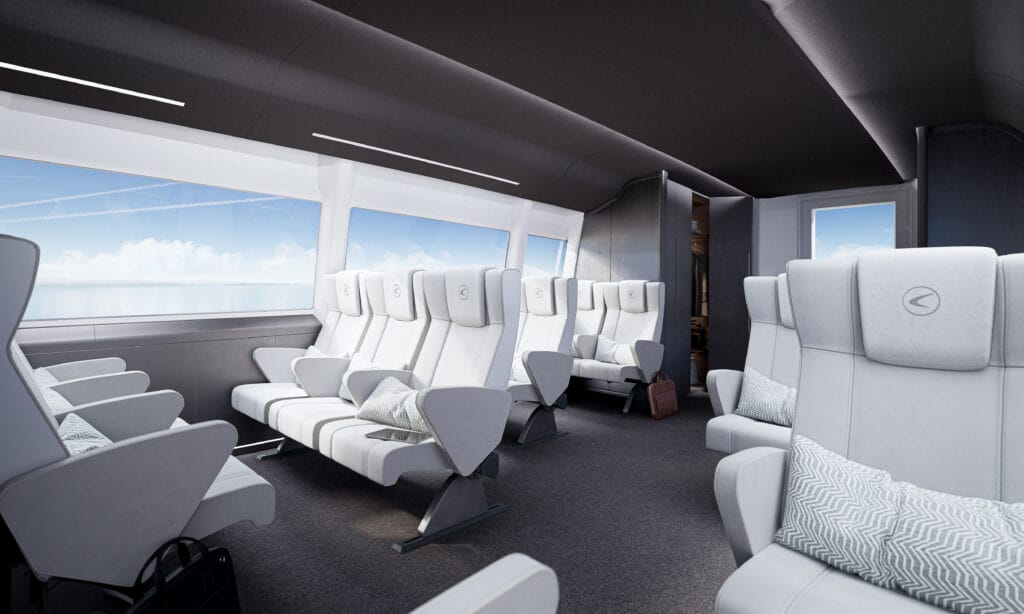
Electric boatbuilder Candela races ahead with foiling passenger ferries

As the maritime sector grapples with the urgency of fossil-free alternatives, Swedish electric boat producer Candela is changing the world of ferries and transportation.
Founded in 2014 with an ambitious mission, the Stockholm-based company continues accelerating the electric transition with its innovative hydrofoil electric vessels that ‘fly’ above the water, using a claimed 80 per cent less energy.
In March 2024, Candela closed the most significant funding round in its history, securing €24.5 million from investors led by Groupe Beneteau, a key partner in this milestone. The cash injection has set the stage for an expansion of production for its P-12 electric ferry, a vessel that promises to redefine electric maritime transportation.
Most recently, in August 2024 Candela signed a deal to supply eight P-12 vessels to NEOM, a global development project in northwest Saudi Arabia. This marks the largest order in Candela’s history; deliveries for the foiling passenger ferries are scheduled for early 2025 and 2026.

Candela P-12 and C-8
The P-12 fleet will service NEOM’s waterways along the Red Sea coast. The vessel will debut in Stockholm’s public transport system later this year before its deployment in Saudi Arabia.
Gustav Hasselskog, CEO and founder of Candela, says: “The P-12 is designed to create zero-emission water transport systems which significantly improve traditional water commuting.
“Unlike legacy systems with large, slow, and energy-inefficient conventional ferries, the Candela P-12 is a smaller and faster unit, allowing much more frequent departures and quicker journeys for passengers. All daily necessities and services will be just a short boat commute away.”
Accelerating production
“We are manufacturing the first P-12 vessels in our Stockholm factory, where we already build the C-8 at a pace of one per week,” says Mikael Mahlberg, head of PR and communications at Candela. “But as we have the new P-12 deals coming in, we are going to announce the next steps in terms of growing Candelas manufacturing.”
In 2019, the company launched recreational ‘flying boats’ with the C-7 and C-8, which have since rapidly evolved in the commercial market. With various glowing accolades and reviews under its belt, Candela introduced the P-12 in its move into electric foiling passenger ferries in 2023. The first of its kind, this long-range electric ferry is joining Stockholm’s city fleet of ferries in a pilot programme this year.
Compared to traditional diesel vessels, the P-12 is estimated to cut lifetime emissions by 97.5 per cent. Utilising a system of hydrofoils which lifts the hull out of the water – versus simply pushing the bow through the water – it has an onboard flight controller that steadily controls it. Thanks to the minimal wake the vessel generates, it is exempt from speed restrictions.
Earlier this year, Candela also announced the P-12 will roll out in New Zealand, where Meridian Energy is set to operate the P-12 ferry in Lake Manapōuri, in 2025. One of its major selling points of the Candela vessels is the lack of wake, and this has been key to the contract with Lake Manapōuri, part of a UNESCO World Heritage Area and home to many indigenous species, including longfin eel.

Candela electric ferry catamaran with Stockholm waterfront behind
Beneteau invests in Candela
While Candela has proved its innovation and technology over the last few years, the growing company required further investment to materialise its concept. Meanwhile, larger companies including Beneteau were on the lookout for such technology to capitalise on.
“Potential partnerships are very interesting to explore, and Beneteau is the world’s largest boat manufacturer with vast capabilities,” says Mahlberg.
As with many of the larger boat dynasties, Beneteau has had to begin working towards sustainable solutions such as the group’s B-Sustainable programme, launched in 2022. Bringing Candela’s total funding to over €70 million, other investors included EQT Ventures, Ocean Zeo LLC and Kan Dela AB.
An electric course
The path to more sustainable maritime transportation isn’t void of challenges, though, from energy use to range to economics. Mahlberg explains: “Drop large batteries in a conventional hull, and you end up with a very low range at high speed and huge costs for building the vessel, as well as dockside infrastructure as you need MW chargers on land. You end up with a solution that is three times more expensive than a diesel ship with less performance.”
However, the P-12 shifts this narrative; by harnessing the hydrofoil technology, the vessel operates with a fraction of the energy demands of conventional ferries. “The P-12 provides an opex saving of around 50 per cent thanks to its efficiency, using 80 per cent less energy than conventional boats. It provides operators with a robust, economic incentive to switch to a sustainable vessel,” Mahlberg says.
In terms of charging, a car charger at the end stop of a route is sufficient, translating to the minimal investment required for dockside infrastructure. Its ramp can handle dock heights from 0.2 to 2 metres.
As a pioneering electric and hydrofoil ferry developer, Candela has found itself navigating new territory. “We have learnt a lot. It’s the first foiling electric passenger vessel, and regulations have not been there as no such vessel has existed before,” comments Mahlberg.

P-12 interior concept
New territories
Demand and feedback have been positive, with a global appetite emerging for the foiling passenger ferries. Mahlberg says: “People love flying on it, in silence, above the waves – it is a unique experience. We see big demand from the Gulf region and Asia, especially with hotels, resorts and private operators showing huge demand.”
Along with the hefty Beneteau investment, various other partnerships have developed, unlocking further opportunities that will help accelerate the worldwide adoption of the ferries. This includes a multi-year collaboration with Polestar, which now provides battery and charging systems for Candela’s hydro foiling boats: “This partnership is very valuable, enabling us to get DC charging and great batteries at scale,” says Mahlberg.
The future is foils
With the potential regulatory horizon developing, Mahlberg foresees two paths forward for boaters: “Either go fast and far on electricity in a foiling boat or go slow in a conventional boat. There is no in-between because you cannot make a conventional planing boat that offers compelling performance simply because planing hulls use so much energy. And as most people prefer to go fast, I think foiling boats will dominate the biggest leisure boat markets.
“We are on a hyper-growth journey, and now the focus is on P-12. To scale production, as we will eventually need to build hundreds of units yearly to satisfy demand,” concludes Mahlberg.
The post Electric boatbuilder Candela races ahead with foiling passenger ferries appeared first on Marine Industry News.
